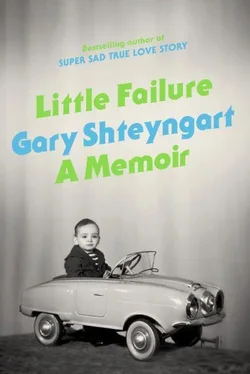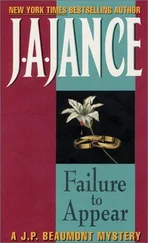
There are five boys who are marginalized at SSSQ. There is Jerry Himmelstein, whose victimization deserves its own after-school special and who will transfer out of our moronic inferno by grade 6. There’s Sammy (not his real name), a slim, sad, hyperactive boy who likes to jump on us while screaming “ URSH! UUUUURSH! ”—some deep-seated primal scream that can be translated into neither Hebrew nor English. There’s David the Mighty Khan Caesar, ruler of the Imperial Lands of David, the main enemy and sometimes ally of my mythical Holy Gnuish Empire. David’s a smart son of a rabbi who takes out a little spaceship in the middle of class and floats it before his freckled face while humming, “ Noooooo … Mmm … Woooo …,” rather similar to the aviation pursuits I enjoy with my pen. There is me. And then there is Jonathan.
Jonathan’s personality has not been reduced to the level where he has to call himself Gary Gnu III or the Mighty Khan Caesar, but he is clearly not cut out for SSSQ either. He has kind and attractive parents, an adorable sister, the collie of my dreams; and this perfect-to-my-eyes family lives in a spacious, castle-like Tudor in Jamaica Estates, the kind of Tudor Dr. Jason Robards and his beautiful elderly wife enjoyed before it was vaporized in The Day After . Jonathan is short like me, and his good looks are partially hidden by a layer of baby fat. When an Israeli throws a dodgeball at him with all of his compressed Canaanite fury, Jonathan will get hit and fall to the ground clutching his elbow, just like me. Another strike against him is that his mom and dad are too shy to participate in the shtetl network of SSSQ parents, a network that’s mirrored in the friendships of the kids themselves. My own parents (“ Ver is man toilet?”), of course, are completely unclubbable.
Finally, Jonathan is smart. Brilliant. And, as the old stereotype of Jews as the People of the Book dies a quiet daily death around us, Jonathan and I are also so very fucking bored. And now that my accent has faded and my English is strong and I can converse at a kilometer a minute, we become friends to the exclusion of everything else.
Saturday is his house; Sunday is mine. Or the other way around. The Jamaica Estates Tudor with its dedicated computer room or my Deepdale Gardens apartment with its treacherous red shag carpet. His Apple //e computer or my new Commodore 64 with Datasette drive (forty-three minutes to load a game). And when our playdates are over and we are shuttled back to our respective homes in Papa’s Tredia-S, or his dad’s AMC wagon, we rush to our push-button phones to call each other, work out further clues to Infocom Software’s Hitchhiker’s Guide to the Galaxy or Zork II, the nerdacious new “interactive fiction” computer games that don’t just take over our lives but are our lives, our brains buzzing with the idea that there are problems in the world that can actually be solved.
When Jonathan’s father drives me home I feel safer than ever. One day I want to have a son or daughter I can drive home in a sturdy car like this AMC wagon. My father has only recently taken to the road, and his car has been known to flip over a median and fall into a ditch, but Jonathan’s father is clearly to the wheel born. He asks me questions about school, and we laugh about some of the wackier aspects of SSSQ: Pilot Program and how easy the homework is, and whether Jonathan and I should go to Harvard or Yale when we grow up (Jonathan will eventually go to Yale, me not so much). When he delivers me to my own parents, their very expressions change; they become softer, as if the Americanness is transferrable somehow. In another decade I will find out that even as my parents are slowly clawing up the ladder, Jonathan’s father’s business — he owns a company that installs doors throughout the city — is in great difficulty, to the point that some of his SSSQ tuition is paid for in repair work. Later, cancer will take his life. The thought that this kind man, this perfect family, was going through something more painful than my own never occurs to me. On most days, I have my head so far up my family’s ass I can taste yesterday’s borscht. And that doesn’t leave much room for empathy for others, especially for Americans who the new Sony Trinitron says “have it all.” Sometimes, drunk off of three consecutive hours of Zork, I close the door to Jonathan’s cavernous bathroom, lie down on the soft mat riddled with collie hairs, and breathe in the floral air-freshener scent that even to this day I associate with home. What makes me want to cry is that Jamaica Estates is very close to JFK airport, and when the Soviets strike, my new family will be gone in a flash.
My father is also like a second father to Jonathan. Here is this strong man, manly to a fault, who takes us fishing on a pier off the wealthy suburb of Great Neck. The docks are clearly meant for Great Neck residents only, but my father has found a hole in a chain-link fence, and the three of us scamper through illegally to fish off the rich man’s pier. “ Prokhod dlya oslov! ” Papa proudly declares. “Gary, translate.”
“It’s the passage for donkeys,” I say to Jonathan.
Sometimes we invade the pier of the U.S. Merchant Marine Academy in Kings Point and haul in a catch between the hulls of the military training ships. I love my father’s gentleness with Jonathan, though I am a little jealous, too. Proud that I have a father who can sneak into enemy territory and steal striped bass with just a few jerks of his fishing stick, but wishing that my father could be like that all the time — his English wrong but patient, tender, instructive. “Over zer is mostly flyook and zer is flaunder … Guys, don’t pull feesh so fast! Give him time to get on hook, okay?” Guys. We are guys together in front of my papa. It occurs to me that if we had spoken English instead of Russian at home, my father would have lost some of the natural cruelty that comes with our mother tongue. Eh, you, Snotty. Eh, you, weakling . Because all I want to do now is to speak to Papa and Mama in Jonathan’s English. Which also happens to be my own.
But it’s too late for that.

Sexuality is ripening around us in a way that makes us scared. I can never tell Jonathan about Natasha, my Russian summertime crush, because talk of girls will remind us of our dalit status and shatter the pixilated world we’ve created around ourselves. One beautiful fall day, the parents of one of the wealthiest SSSQ kids rent out the top of the World Trade Center for his Bar Mitzvah, complete with a harpsichordist strumming a classical version of “Hava Nagila” in the sky lobby, sevruga caviar by the spoonful, men in uniform bearing the boy’s name on their lapels at the toilet stations, and a series of buses to ferry us from Queens to the monstrous twin skyscrapers.
On the way home to Queens in the rented buses, two of the more advanced boys crowd around the girl who has developed the most breasts and jerk themselves off to her loud laughter. The news reaches our front row, and Jonathan and I are duly shocked. This never happens in our computer games. We have seen Brooke Shields in a swim-suit in People magazine, and we tried to put two Panasonic VHS recorders together to dub the R-rated version of the John Boorman film Excalibur , rife with both frontal and dorsal nudity (it never quite worked out for us). But the idea that two boys, one not even an Israeli, would take out their zains in the back of a plush rented bus and cream themselves over a girl is beyond our sense of reality. As I fold myself into my safe red Soviet comforter at bedtime, Papa sometimes makes an appearance in my bedroom with the encouraging words “Are you tugging yourself? Well, don’t tug too hard. It’ll fall off.” And then deep in the night Dr. Ruth Westheimer will whisper into my headphones the difference between clitoral and vaginal orgasms, but these are just words for me to put away for another lifetime, maybe for after law school. Am I supposed to tug at myself like those boys? Will that make my parents and my teachers happy? It’s too much to think about. I’d rather just play Zork with my best friend, Jonathan.
Читать дальше













